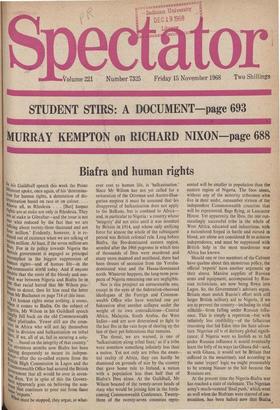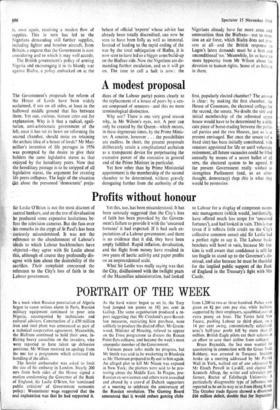Biafra and human rights
In his Guildhall speech this week the Prime Minister spoke, once again, of his 'determina- tion for human rights, a detestation of dis- crimination based on race or on colour. . . . Above all, in Rhodesia . . . [But] human rights are at stake not only in Rhodesia. They are at stake in Gibraltar—and the issue is not one whit reduced by the fact that we are talking about twenty-three thousand and not tour million.' Evidently, however, it is re- duced out of existence when we are talking of 41eJen million. At least, if the seven million are Ibos. For in its policy towards Nigeria the raish government is engaged as principal eomplice in the biggest suppression of 4n-tan rights—and of human life—in the 41-communist world today. And if anyone °abts that the roots of the bloody and one- ;ued war between Nigeria and Biafra lie in ust that racial hatred that Mr Wilson pro- sses to detest, then let him read the letter °,111 Mr Buchanan on page 714 of this issue. Yet human rights mean nothing, it seems, en it comes to Biafra. On the subject of ;igeria, Mr Wilson in his Guildhall speech simply fell back on the old Commonwealth 1ace platitudes. 'Fewer still are the coun- hes in Africa who will not lay themselves ea to division and balkanisation on tribal if we, all of us, fail in securing a solu- • • based on the integrity of that country.' Chr seventeen months now Biafra has been qe`"„"ntig desperately to secure its indepen- iir'f,e—after the so-called experts from the High Commission in Lagos and the golllitnonwealth Office had assured the British iee'ernment that all would be over in seven- i days. Yet in spite of this the Govern- atuT: apparently goes on believing the non- that continues to pour out from these 4\1\7:experts.' ever cost to human life, is 'balkanisation.' Since Mr Wilson has not yet called for a restoration of the Ottoman and Austro-Hun- garian empires it must be assumed that his disapproval of balkanisation does not apply to the Balkans, but is confined to Africa— and, in particular to Nigeria : a country whose `integrity' did not exist until it was invented by Britain in 1914, and whose only unifying force for almost the whole of the subsequent period was British colonial rule. Long before Biafra, the Ibo-dominated eastern region, seceded after the 1966 pogroms in which tens of thousands of Ibos were murdered and many more maimed and mutilated, there had been threats of secession from the Yoruba- dominated west and the Hausa-dominated north. Whatever happens, the long-term pros- pects of Nigeria remaining one are negligible.
Nor is this prospect an unreasonable one, except in the eyes of the federation-obsessed ideologues of the Foreign and Common- wealth Office who have watched one pet federation after another collapse under the weight of its own contradictions—Central Africa, Malaysia, South Arabia, the West Indies—and are now determined to fight to the last Ibo in the vain hope of shoring up the last of their pet federations that remains.
The threat, we are warned, is one of `balkanisation along tribal lines,' as if a tribe were somehow something infinitely less than a nation. Yet not only are tribes the essen- tial reality of Africa, they can hardly be dismissed on grounds of size by the country that gave home rule to Ireland, a nation with a population less than half that of Biafra's Ibos alone. At the Guildhall, Mr Wilson boasted of the twenty-seven heads of state who would be joining him in the forth- coming Commonwealth Conference. Twenty- three of the twenty-seven countries repre- sented will be smaller in population than the eastern region of Nigeria. The I bos alone, without any of the minority tribesmen who live in their midst, outnumber sixteen of the independent Commonwealth countries that will be represented, flags flying, at Lancaster House. Yet apparently the Ibos, the one out- standingly successful tribe in the whole of West Africa, educated and industrious, with a nationhood forged in battle and earned in blood, are alone not considered fit to achieve independence, and must be suppressed with British help in' the most murderous war Africa has known.
Should one or two members of the Cabinet have qualms about this monstrous policy, the official 'experts' have another argument up their sleeve. Massive supplies of Russian arms and equipment, accompanied by Rus- sian technicians, are now being flown into Lagos. So, the Government's advisers argue, Britain must match Russia's effort with still larger British military aid to Nigeria, if we are to prevent the country—including its vital oilfields—from falling under Russian influ- ence. This is simply a repetition –but with infinitely less credibility—of the fallacious reasoning that led Eden into the Suez adven- ture. Nigerian oil is of derisory global signifi- cance; if Nigeria were so foolish as to fall under Russian influence it would eventually learn the folly of its ways (as Ghana did—and, as with Ghana, it would not be Britain that suffered in the meantime); and according to the same 'expert' logic we ought presumably to be arming Nasser to the hilt because, the Russians are.
At the present time the Nigeria-Biafra war has reached a state of stalemate. The Nigerian army's much-vaunted 'final push,' which went so well when the Biafrans were starved of am- munition, has been halted now that Biafra., is, once again, receiving a modest flow of supplies. This in turn has led to the Nigerians demanding still further supplies, including fighter and bomber aircraft, from Britain, a request that the Government is now considering and to which it may well accede.
The British government's policy of arming Nigeria and encouraging it in its bloody war against Biafra, a policy embarked on at the behest of official 'experts' whose advice has already been totally discredited, can now be seen to have been folly as well as immoral. Instead of leading to the rapid ending of the war by the total subjugation of Biafra, it is now seen to have led to a bigger arms build-up on the Biafran side. Now the Nigerians are de- manding further escalation, and so it will go on. The time to call a halt is now : the Nigerians already have far more arms and ammunition than the Biafrans—not to men- tion an air force, which Biafra does not pos- sess at all—and the British response to Lagos's latest demands must be a firm and unconditional 'no.' Meanwhile, let us have no more hypocrisy from Mr Wilson about his devotion to human rights. Some of us believe in them.







































